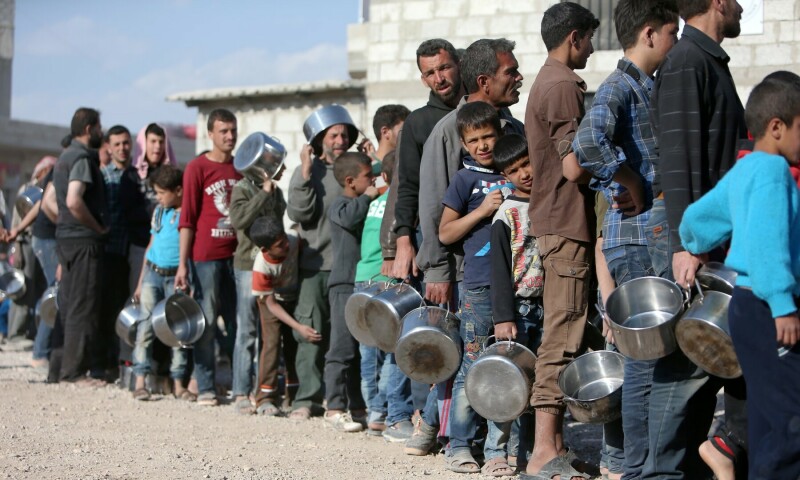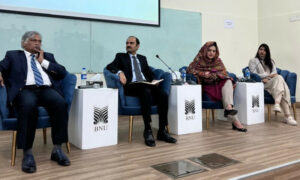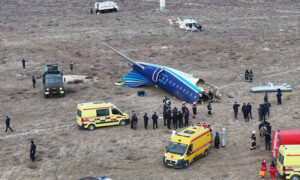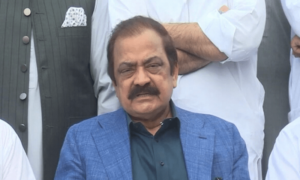UN ends 2024 raising 46pc of $49.6bn global humanitarian aid, marking the second year in a row where it raised less than half of what it sought.
It’s a simple but brutal equation: The number of people going hungry or otherwise struggling around the world is rising, while the amount of money the world’s wealthiest nations are contributing toward helping them is dropping.
The result: The United Nations says that, at best, it will be able to raise enough money to help about 60 per cent of the 307 million people it predicts will need humanitarian aid next year. That means at least 117m people won’t get food or other assistance in 2025.
The UN also will end 2024 having raised about 46pc of the $49.6 billion it sought for humanitarian aid across the globe, its own data shows.
It’s the second year in a row the world body has raised less than half of what it sought. The shortfall has forced humanitarian agencies to make agonising decisions, such as slashing rations for the hungry and cutting the number of people eligible for aid.
The consequences are being felt in places like Syria, where the World Food Program (WFP), the UN’s main food distributor, used to feed 6m people.
Eyeing its projections for aid donations earlier this year, the WFP cut the number it hoped to help there to about 1m people, said Rania Dagash-Kamara, the organisation’s assistant executive director for partnerships and resource mobilisation.
Dagash-Kamara visited the WFP’s Syria staff in March. “Their line was, ‘We are at this point taking from the hungry to feed the starving’,” she said in an interview.
UN officials see few reasons for optimism at a time of widespread conflict, political unrest and extreme weather, all factors that stoke famine.
“We have been forced to scale back appeals to those in most dire need,” Tom Fletcher, UN under-secretary-general for humanitarian affairs and emergency relief coordinator, told Reuters.
The funding gap
Conflict, extreme weather and soaring inflation have left growing numbers of people in need of humanitarian aid.
Also increasing is the gap between the funding the UN seeks for humanitarian relief and the amount donors actually provide. Financial pressures and shifting domestic politics are reshaping some wealthy nations’ decisions about where and how much to give.
One of the UN’s largest donors — Germany — already shaved $500m in funding from 2023 to 2024 as part of general belt-tightening. The country’s cabinet has recommended another $1bn reduction in humanitarian aid for 2025. A new parliament will decide next year’s spending plan after the federal election in February.
Humanitarian organisations also are watching to see what US President-elect Donald Trump proposes after he begins his second term in January.
Trump advisers have not said how he will approach humanitarian aid, but he sought to slash US funding in his first term. And he has hired advisers who say there is room for cuts in foreign aid.
The US plays the leading role in preventing and combating starvation across the world. It provided $64.5bn in humanitarian aid over the last five years.
That was at least 38pc of the total such contributions recorded by the UN.
Sharing the wealth
The majority of humanitarian funding comes from just three wealthy donors: the US, Germany and the European Commission. They provided 58pc of the $170bn recorded by the UN in response to crises from 2020 to 2024.
Three other powers China, Russia and India collectively contributed less than 1pc of UN-tracked humanitarian funding over the same period, according to a Reuters review of UN contributions data.
The inability to close the funding gap is one of the major reasons the global system for tackling hunger and preventing famine is under enormous strain. The lack of adequate funding coupled with the logistical hurdles of assessing need and delivering food aid in conflict zones, where many of the worst hunger crises exist is taxing efforts to get enough aid to the starving.
Almost 282 million people in 59 countries and territories were facing high levels of acute food insecurity in 2023.
Reuters is documenting in a series of reports, including from hard-hit Sudan, Myanmar and Afghanistan.
The failure of major nations to pull their weight in funding for global initiatives has been a persistent Trump complaint. Project 2025, a set of policy proposals drawn up by Trump backers for his second term, calls on humanitarian agencies to work harder to collect more funding from other donors and says this should be a condition for additional US aid.
On the campaign trail, Trump tried to distance himself from the controversial Project 2025 blueprint. But after winning the election, he chose one of its key architects, Russell Vought, to run the US Office of Management and Budget, a powerful body that helps decide presidential priorities and how to pay for them.
For secretary of state, the top US diplomat, he tapped Florida Senator Marco Rubio, who has a record of supporting foreign aid.
Project 2025 makes particular note of conflict the very factor driving most of today’s worst hunger crises.
Humanitarian aid is sustaining war economies, creating financial incentives for warring parties to continue fighting, discouraging governments from reforming, and propping up malign regimes, the blueprint says.
It calls for deep cuts in international disaster aid by ending programs in places controlled by malign actors.
Billionaire Elon Musk has been tapped by Trump to co-lead the Department of Government Efficiency (DOGE), a new body that will examine waste in government spending. Musk said this month on his social media platform, X, that DOGE would look at foreign aid.
The aid cuts Trump sought in his first term didn’t pass Congress, which controls such spending. Senator Lindsey Graham, a South Carolina Republican and close Trump ally on many issues, will chair the Senate committee that oversees the budget.
In 2019, he called insane and short-sighted a Trump proposal to cut the budget for foreign aid and diplomacy by 23pc.
Graham, Vought, Rubio and Musk did not respond to questions for this report.
Olympics and spaceships
So many people have been hungry in so many places for so long that humanitarian agencies say fatigue has set in among donors. Donors receive appeal after appeal for help, yet have limits on what they can give. This has led to growing frustration with major countries they view as not doing their share to help.
Jan Egeland was UN humanitarian chief from 2003 to 2006 and now heads the Norwegian Refugee Council, a nongovernmental relief group. Egeland said it is “crazy” that a tiny country like Norway is among the top funders of humanitarian aid. With a 2023 gross national income (GNI) less than 2pc the size of the Americas, Norway ranked seventh among governments who gave to the UN that year, according to a Reuters review of UN aid data. It provided more than $1bn.
Two of the five biggest economies China and India gave a tiny fraction as much.
China ranked 32nd among governments in 2023, contributing $11.5m in humanitarian aid. It has the world’s second-largest GNI.
India ranked 35th that year, with $6.4m in humanitarian aid. It has the fifth-largest GNI.
Egeland noted that China and India each invested far more in the type of initiatives that draw world attention. Beijing spent billions hosting the 2022 Winter Olympics, and India spent $75m in 2023 to land a spaceship on the moon.
“How come there is not more interest in helping starving children in the rest of the world?” Egeland said. “These are not developing countries anymore. They are having Olympics … They are having spaceships that many of the other donors never could dream of.”
Liu Pengyu, spokesman for the Chinese embassy in Washington, said China has always supported the WFP. He noted that it feeds 1.4bn people within its own borders. “This in itself is a major contribution to world food security,” he said.
India’s ambassador to the UN and its Ministry of External Affairs did not respond to questions for this report.
To analyse giving patterns, Reuters used data from the UN’s Financial Tracking Service, which records humanitarian aid. The service primarily catalogues money for UN initiatives and relies on voluntary reporting.
It doesn’t list aid funnelled elsewhere, including an additional $255m that Saudi Arabia reported giving this year through its own aid organisation, the King Salman Humanitarian Aid & Relief Centre.
Restrictions and delays
When aid does come, it is sometimes late, and with strings attached, making it hard for humanitarian organisations to respond flexibly to crises.
Aid tends to arrive when the animals are dead, people are on the move, and children are malnourished, said Julia Steets, director of the Global Public Policy Institute, a think tank based in Berlin.
Steets has helped conduct several UN-sponsored evaluations of humanitarian responses. She led one after a drought-driven hunger crisis gripped Ethiopia from 2015 to 2018. The report concluded that while famine was avoided, funding came too late to prevent a huge spike in severe acute malnutrition in children.
Research shows that malnutrition can have long-term effects on children, including stunted growth and reduced cognitive abilities.
Further frustrating relief efforts are conditions that powerful donors place on aid. Donors dictate details to humanitarian agencies, down to where food will go. They sometimes limit funding to specific UN entities or nongovernmental organisations. They often require that some money be spent on branding, such as displaying donors’ logos on tents, toilets and backpacks.
Aid workers say such earmarking has forced them to cut rations or aid altogether.
The US has a long-standing practice of placing restrictions on nearly all of its contributions to the World Food Program, one of the largest providers of humanitarian food assistance. More than 99pc of US donations to the WFP carried restrictions in each of the last 10 years, according to WFP data reviewed by Reuters.
Asked about the aid conditions, a spokesperson for the US Agency for International Development, which oversees American humanitarian spending, said the agency acts “in accordance with the obligations and standards required by Congress.”
Those standards aim to improve the efficiency and effectiveness of humanitarian aid, the spokesperson said, and aid conditions are meant to maintain “an appropriate measure of oversight to ensure the responsible use of US taxpayer funds.”
Some current and former officials with donor organisations defend their restrictions. They point to theft and corruption that have plagued the global food aid system.
In Ethiopia, as Reuters has detailed, massive amounts of aid from the UN World Food Program were diverted, in part because of the organisation’s lax administrative controls. An internal WFP report on Sudan identified a range of problems in the organisation’s response to an extreme hunger crisis there, Reuters reported earlier this month, including an inability to react adequately and what the report described as “anti-fraud challenges.”
The UN has a “zero tolerance policy” toward “interferences” that disrupt aid and is working with donors to manage risks, said Jens Laerke, spokesperson for the UN Office for the Coordination of Humanitarian Affairs.
Solving the UN’s broader fundraising challenges will require a change in its business model, said Martin Griffiths, who stepped down as UN humanitarian relief chief in June. “Obviously, what we need to do is to have a different source of funding.”
In 2014, Antonio Guterres, now the UN’s secretary-general and then head of its refugee agency, suggested a major change that would charge UN member states fees to fund humanitarian initiatives. The UN’s budget and peacekeeping missions already are funded by a fee system. Such funding would offer humanitarian agencies more flexibility in responding to needs.
The UN explored Guterres’ idea in 2015. But donor countries preferred the current system, which lets them decide case by case where to send contributions, according to a UN report on the proposal.
Laerke said the UN is working to diversify its donor base.
“We can’t just rely on the same club of donors, generous as they are and appreciative as we are of them,” Laerke said.
Header Image: Internally displaced Syrians from eastern Ghouta queue for food in Herjelleh shelter in Damascus countryside, Syria, April 15, 2018. — Reuters






